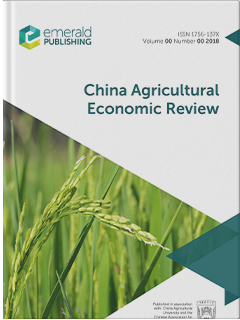农业环境可持续性的经济学分析:最近使用准实验方法的研究
IF 4.6
2区 经济学
Q1 AGRICULTURAL ECONOMICS & POLICY
引用次数: 1
摘要
目的这篇综述文章的目的是证明准实验方法是如何用于研究与农业生产有关的环境和自然资源问题的。设计/方法论/方法这篇综述文章首先简要介绍了使用潜在成果框架的准实验方法,然后利用对农业生产环境可持续性的研究来说明准实验方法是如何应用的。所审查的论文包括估计农业生产的环境外部性的研究,评估农业环境和其他相关政策和计划,并展示与农场资源使用和气候适应相关的问题。FindingsDifference in Difference(DID)和利用面板数据中的空间和时间变化的双向固定效应方法被广泛用于估计农业生产和政策变化对环境的因果影响。利用农业政策和法规造成的不连续性和限制,使用回归不连续性(RD)或工具变量(IV)方法和横断面数据来估计当地处理对土地和其他投入使用的影响。独创性/价值粮食系统面临的挑战使农业可持续性比以往任何时候都更加重要。在过去的三十年里,准实验方法已经成为应用经济研究的动力。这篇综述文章侧重于农业环境可持续性的准实验研究,以提供方法论见解,并强调农业可持续性经济学文献中的空白。本文章由计算机程序翻译,如有差异,请以英文原文为准。
Economic analysis of the environmental sustainability of agriculture: recent studies using quasi-experimental methods
PurposeThe purpose of this review article is to demonstrate how the quasi-experimental approach has been used to study environmental and natural resource issues related to agricultural production.Design/methodology/approachThis review article first provides a short introduction to the quasi-experimental approach using the potential outcomes framework and then uses studies on the environmental sustainability of agricultural production to illustrate how quasi-experimental methods have been applied. Papers reviewed consist of studies that estimate the environmental externalities from agricultural production, evaluate agri-environmental and other related policies and programs, and demonstrate issues related to on-farm resource use and climate adaptation.FindingsDifference-in-differences (DID) and two-way fixed effects methods that utilize the spatial and temporal variation in panel data are widely used to estimate the causal impact of changes in agricultural production and policy on the environment. Utilizing the discontinuities and limits created by agricultural policies and regulations, local treatment effects on land and other input use are estimated using regression discontinuity (RD) or instrumental variable (IV) methods with cross-sectional data.Originality/valueChallenges faced by the food systems have made agricultural sustainability more critical than ever. Over the past three decades, the quasi-experimental approach has become the powerhouse of applied economic research. This review article focuses on quasi-experimental studies on the environmental sustainability of agriculture to provide methodological insights and to highlight gaps in the economics literature of agricultural sustainability.
求助全文
通过发布文献求助,成功后即可免费获取论文全文。
去求助
来源期刊

China Agricultural Economic Review
AGRICULTURAL ECONOMICS & POLICY-
CiteScore
9.80
自引率
5.90%
发文量
41
审稿时长
>12 weeks
期刊介绍:
Published in association with China Agricultural University and the Chinese Association for Agricultural Economics, China Agricultural Economic Review publishes academic writings by international scholars, and particularly encourages empirical work that can be replicated and extended by others; and research articles that employ econometric and statistical hypothesis testing, optimization and simulation models. The journal aims to publish research which can be applied to China’s agricultural and rural policy-making process, the development of the agricultural economics discipline and to developing countries hoping to learn from China’s agricultural and rural development.
 求助内容:
求助内容: 应助结果提醒方式:
应助结果提醒方式:


